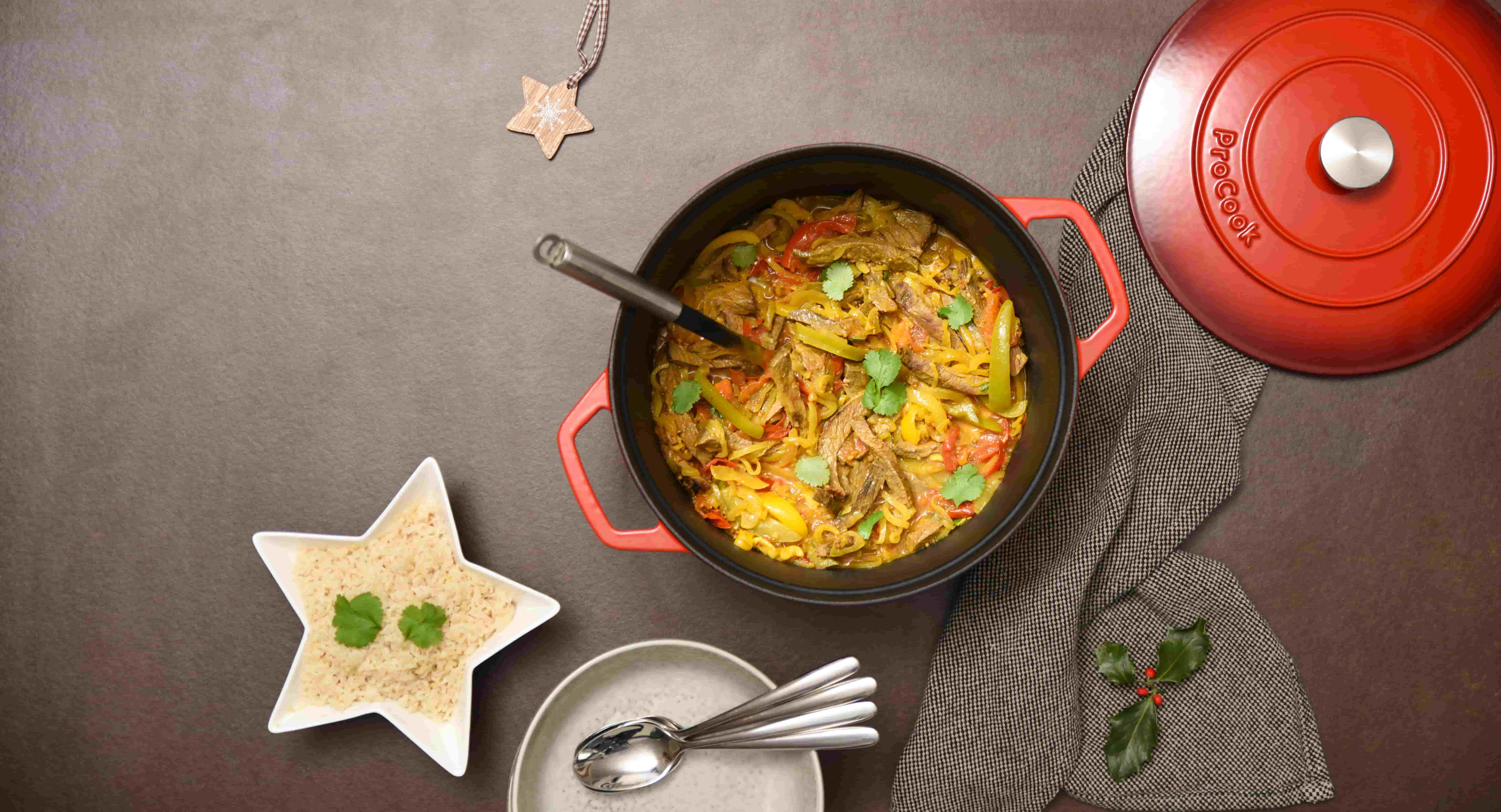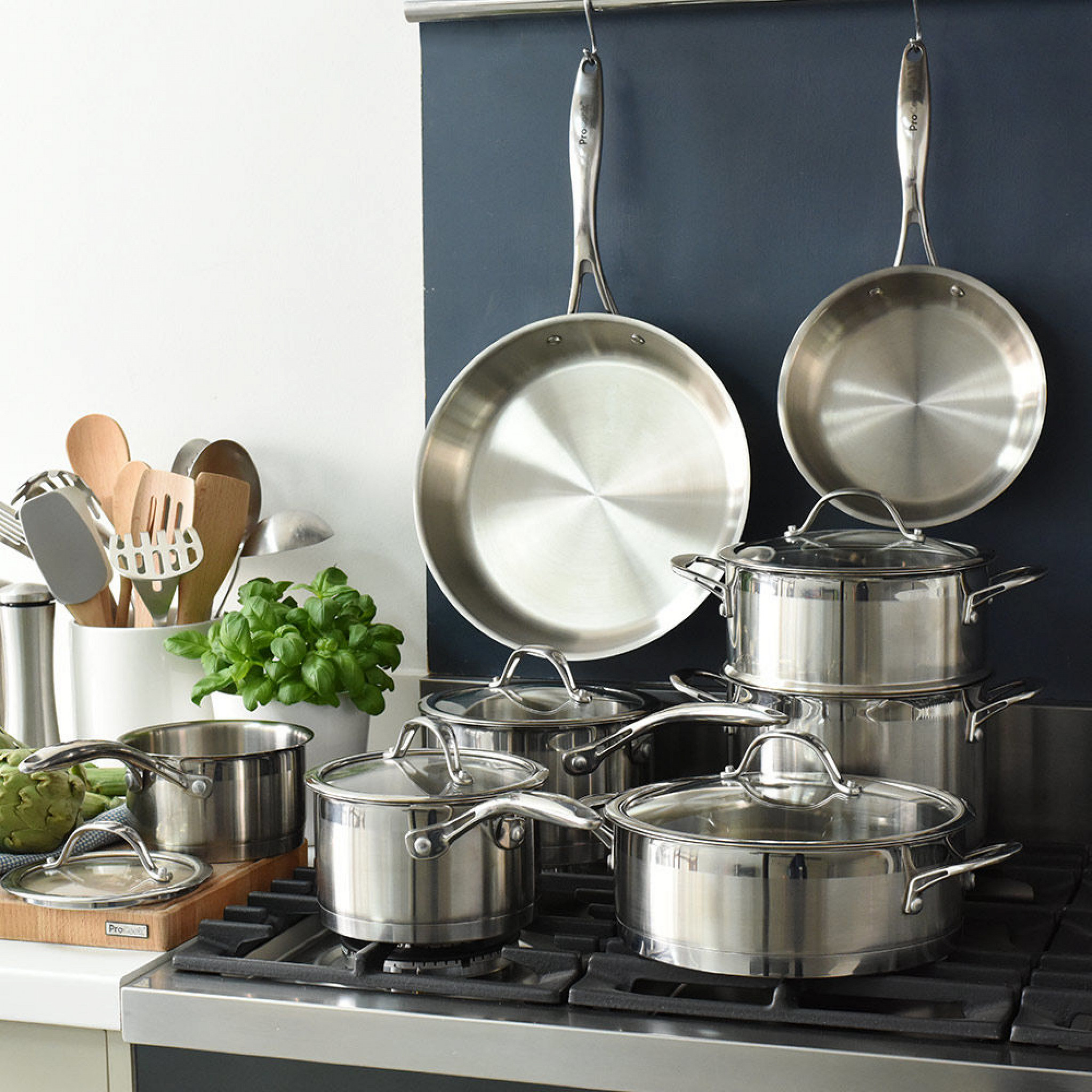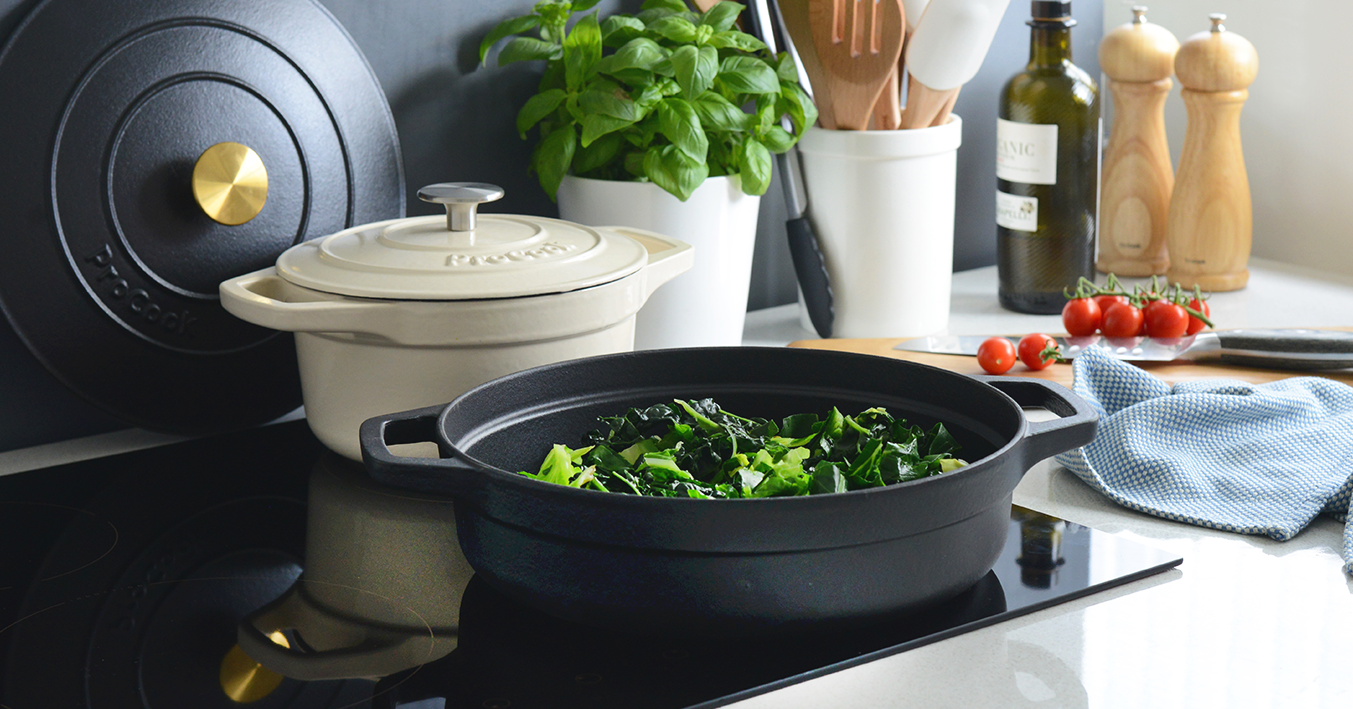ProCook Help Hub
The latest inspiration and advice from the experts at ProCook
Whether you're new to using cast iron or have noticed rust developing, knowing how to clean cast iron cookware properly can improve cooking results while extending its already long lifespan. Our post on 6 Benefits of Cast Iron Cooking highlights the fantastic stand-out features of our Cast Iron products. After all, different levels of care and techniques are required when washing, drying, and storing cast iron.
Covering cast iron cleaning tips to how to clean cast iron skillets, our guide details the very best cast iron care tips.
Unpackage your cast iron cookware and wash your skillet, griddle or casserole dish in hot, soapy water and dry thoroughly. All our cast iron casserole pots are coated with enamel inside and out, so there is no need to pre-season our cast iron pots, skillets and griddles. Rather, simply wash your new casserole pot, griddle or skillet by hand and dry to ensure that it is clean and ready to be used.
TIP: While pre-seasoning is not required with our cast iron range, you may need to lightly oil the rim of both the casserole pot and the lid. By doing this, you are sealing and protecting any raw edges.
Prepare Your Cast Iron Before Use
How to Clean Cast Iron
Cast iron can last you a lifetime - if cared for and used properly. Our guidelines offer the best advice for our cast iron range, so if you are cooking with ProCook cast iron cookware, keep the following tips in mind.
Avoid Scratching the Enamel Surface
The enamel surface can enhance your cooking results and make maintaining your cast iron much easier, so you'll want to protect the enamel surfaces as much as possible. When cooking, only use wooden, nylon or silicone utensils as they are much gentler and reduce the chances of scratching the enamel surface.
Never Plunge Hot Cast Iron in Cold Water
Plunging any hot cookware into cold water can cause irreversible damage, such as warping and cracking. This is because when a pan is heated, the metal slightly expands, and when it cools, it contracts. Avoid filling or plunging your cast iron cookware under cold water when it's fresh off the hob or out of the oven, as this can cause thermal shock and crack or chip your cast iron, reducing its cooking potential.
Be Careful When Soaking Your Cast Iron
Soaking can be appropriate when trying to remove stubborn, burnt-on food. Simply fill your sink with hot, soapy water and leave for an hour to soak. This will not cause harm to the pan unless you are soaking the unenamelled edge.
Although soaking can be a great method for removing difficult dried-on food and stains, we do not recommend submerging your cast iron for many hours at a time.
TIP:
If you have dried-on, stubborn bits of food, you can use a synthetic scrubber. While you should avoid using steel wool, softer scrubbers should not damage your cast iron if used properly. Check out our cleaning products, which include cast iron appropriate scrubbers and our own cast iron cleaner.
Be Careful When Moving Cast Iron
Take care when moving cast iron, whether it be a casserole pot or skillet. Not only do the pan's and casserole pot's surfaces become very hot, but so will the handles. Always use oven gloves or our silicone handles when moving warm cast iron cookware. All our silicone handles are dishwasher safe and can make holding and carrying heavy cast iron much easier, providing thorough protection from hot cast iron handles.
Dry Thoroughly
Moisture can be cast iron's worst enemy. Therefore, avoid rust from developing by ensuring that your cast iron is thoroughly dried once it has been washed. Guarantee there are no damp patches before storing away to protect the integrity of your cast iron.
Wash By Hand
We recommend that you avoid putting your cast iron cookware in the dishwasher and wash by hand instead. Although using a dishwasher to clean items from our cast iron range will not affect their performance, it may result in the dulling of the enamel over time.
Browse our beautiful cast iron cookware:
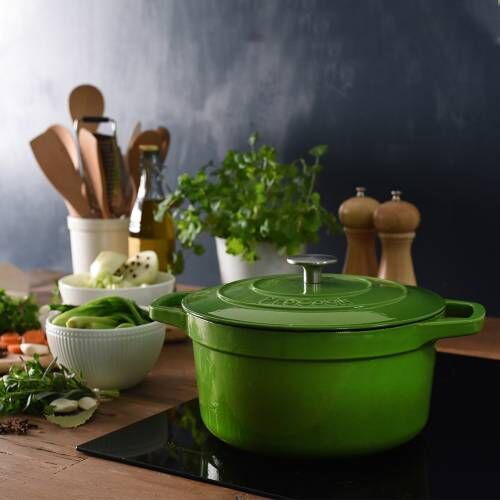
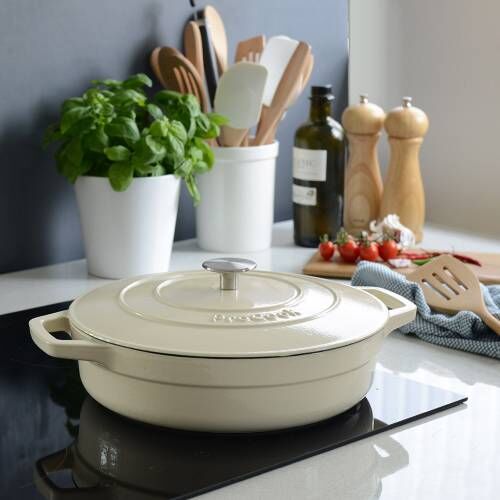
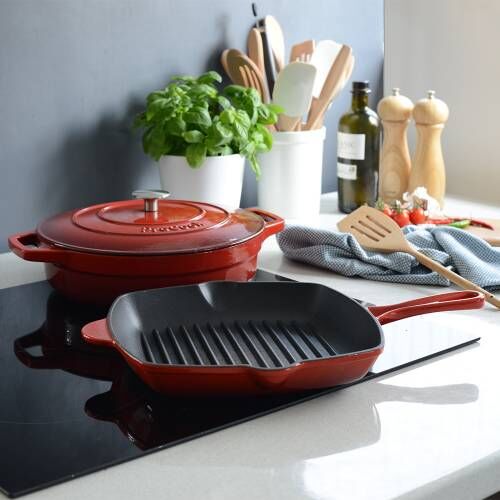
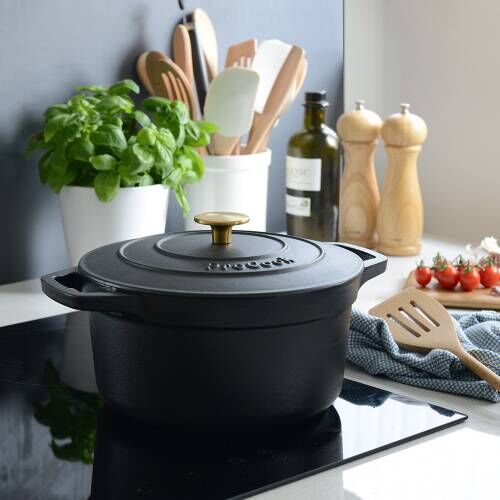
Cleaning a cast iron skillet is not much different to cleaning a cast iron casserole pot or griddle. Much like our cast iron casserole dishes, our cast iron skillets include an enamel coating that makes it corrosion-free and easy to clean.
To clean a cast iron skillet, make sure you use clean, hot and soapy water and a scrubber that won't leave marks or damage the enamel surface. Be wary of how heavy a cast iron skillet is, and keep a good grasp when cleaning to avoid dropping that may cause it to break.
TIP: If your cast iron required seasoning beforehand, then cleaning can be a little more complicated. Check whether seasoning is needed by reading our guide Do I Need to Season My Cast Iron?
How to Clean Cast Iron Skillets
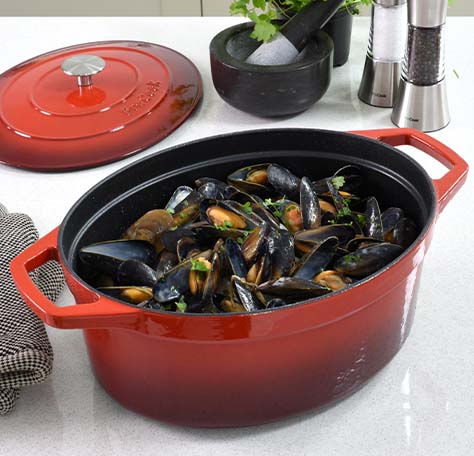
How to Clean Rusty Cast Iron
If rust develops on your cast iron cookware, there are methods to revive it. Of course, read the manufacturer's care instructions before treating the pan or casserole dish yourself. However, the following tips can work wonders.
If the layer of rust is superficial and only on the surface, cleaning your cast iron may be able as simple as using a scrubber and hot, soapy water. Use a mild detergent and a slightly abrasive sponge (but do not use steel wool) until the rust is fully removed before drying it immediately. Aggressive washing and scrubbing may leave scratches.
However, if your cast iron is suffering from a serious rust problem, mix a basic white vinegar with water in equal parts in your sink before submerging your pan into the solution. While we do not recommend submerging and soaking your cast iron for long periods of time, you can soak for up to eight hours. That being said, check your skillet often as the rust may have flaked away after an hour of submergence. Clean your cast iron as usual, making sure to dry it thoroughly before storing.
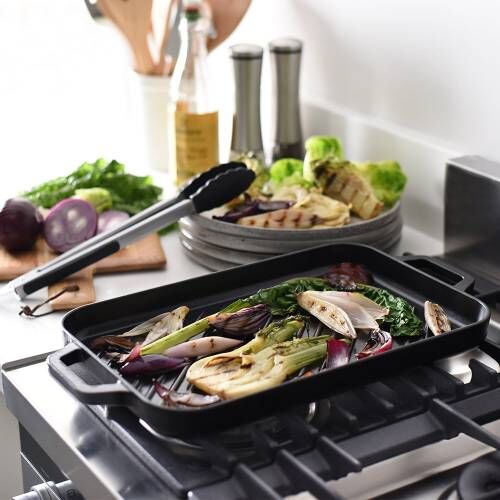
How to Store Cast Iron Pans
Storing your cast iron can be quite simple. Firstly, ensure your cast iron is bone dry before storing it away. Secondly, choose a space that has enough room to avoid your cast iron from being bumped around a lot.
If you need to stack your cast iron skillets, whether it's with other cast iron or with other pots and pans, use pan protectors, which easily sit between your cookware and provide a barrier between the two - reducing the chances of scratches from appearing on surfaces. Be wary when moving your cast iron cookware around, as cast iron is heavy, hard, and somewhat brittle, and could break if dropped.
Check these out:
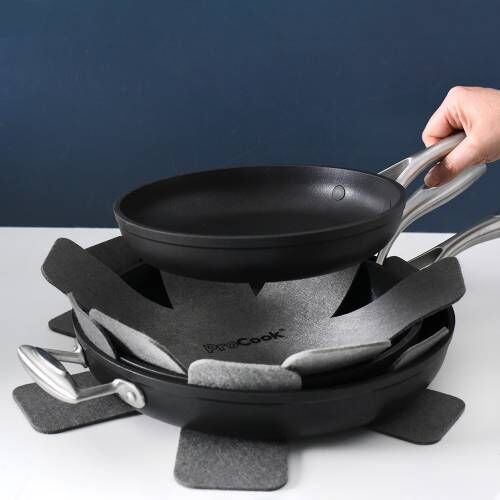
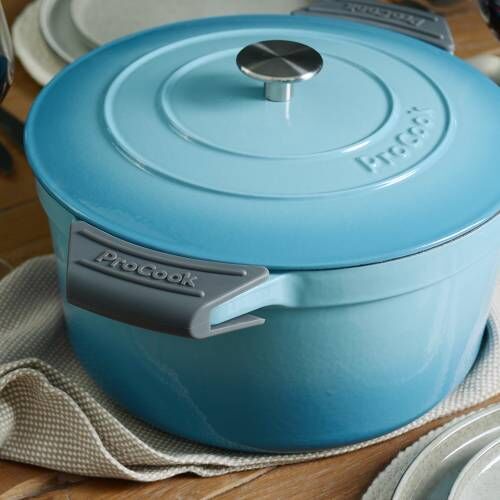
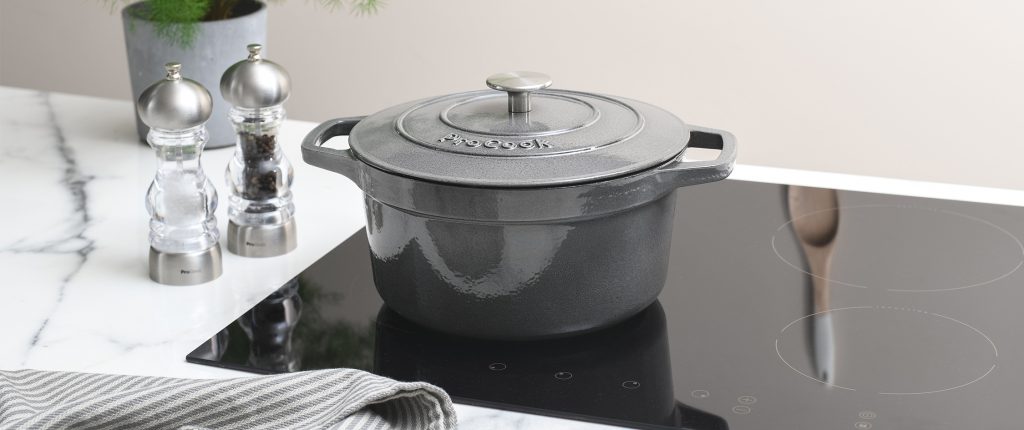
Our beautiful Grey Cast Iron range comes in various shapes and sizes. Suitable for all hob types.

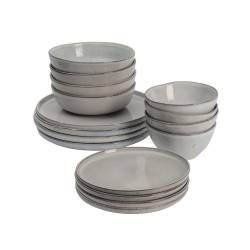
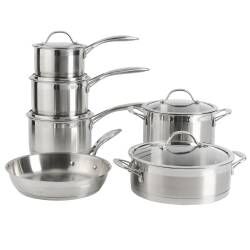
 Electricals
Electricals
 Coffee
Coffee
 Mixers and Blenders
Mixers and Blenders
 Kettles and Toasters
Kettles and Toasters
 Cooking
Cooking
 Small Appliances
Small Appliances
 Cookware & Bakeware
Cookware & Bakeware
 Pots and Pans
Pots and Pans
 Speciality Cookware
Speciality Cookware
 Baking
Baking
 Roasting
Roasting
 Knives
Knives
 Knife Sets
Knife Sets
 Single Knives
Single Knives
 Knife Accessories
Knife Accessories
 Tableware
Tableware
 Single Items
Single Items
 Serveware
Serveware
 Table Accessories
Table Accessories
 Outdoor Dining
Outdoor Dining
 Drinkware
Drinkware
 Hot Drinkware
Hot Drinkware
 Cafetieres and Teapots
Cafetieres and Teapots
 Drink Accessories
Drink Accessories
 Accessories
Accessories
 Kitchen Utensils
Kitchen Utensils
 Tools and Gadgets
Tools and Gadgets
 Storage
Storage
 Cleaning
Cleaning
 Summer desserts and baking
Summer desserts and baking
 Offers
Offers
 Gifting
Gifting
